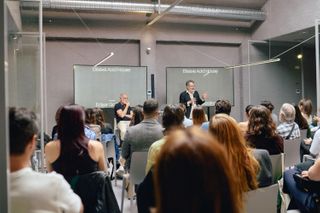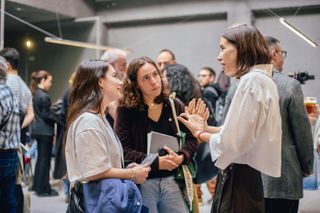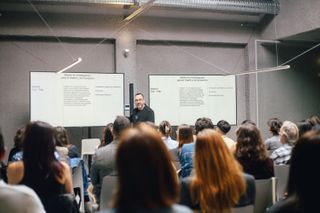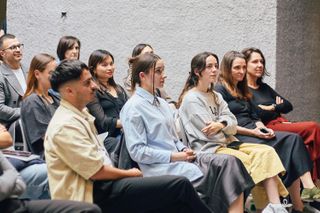- The new centre will offer training in a pioneering field that fuses design, creativity and business
- Similar educational models have already proven their success in leading universities in Denmark, Sweden or the United States
- Eight million new jobs are expected to be generated in the creative economy by 2030, according to the consulting firm Deloitte

In the autumn, Elisava Madrid will open its doors: the first centre in Spain focused exclusively on the training of entrepreneurs in the field of creative industries. In addition, Elisava Madrid proposes a new pedagogical model that will offer training in an educational field hitherto unexplored in our country, where design and creativity meet business.
The project aims to respond to the latent demand for professionals in the field of the creative economy by companies and consultancies. In this respect, recent reports have highlighted the importance of creative thinking for the operation and productivity of the business sector, and its transformative and competitive role.
A sector with eight million new jobs by 2030
Some relevant data from these studies show up to 200% better performance of companies that invest in design compared to those that do not (Source: UK Design Council). Furthermore, over 70% of the companies surveyed in the Spain Design Index recognize “design as a strategic element in business.” In fact, eight million new jobs in the creative economy are expected to be generated by 2030 in nine major economies in the world, including Spain, according to a report by consulting firm Deloitte.
The evidence highlights the transformative role of creativity in the competitiveness of companies. This, together with the obvious paradigm shift in society, marked by the emergence of innovative, user-centred trends, and by disciplines such as artificial intelligence, highlights the need to train a new generation of entrepreneurs.

Pioneering educational model
Elisava Madrid proposes a pioneering pedagogical model that integrates design, creativity and business. Some of the benchmarks of this new educational model, which is about to arrive in Madrid under the guidance of Elisava and Acid House, are leading international universities and pioneers in pedagogical reinvention, where this model already works successfully, such as Kaospilot in Denmark, Hyper Island in Sweden or Minerva in San Francisco.
“Elisava Madrid proposes a disruptive educational model that addresses business challenges with innovative solutions”

"It is a new and disruptive education model that addresses the contemporary challenges of corporations and develops innovative solutions for them,” explains the director of Elisava Madrid, Edgar González, an educator and architect with over twenty-five years of experience working at the intersection of design, technology, the city and innovation at universities such as IE University or IE Business School. “Therefore, it uses the design thinking pattern, as well as its creative methodologies, tools and processes, and applies them in the business context to generate effective, people-centred strategies.”
The new centre will have employees such as Christer Windeløv-Lidzélius, former director of Kaospilot, a leading Danish university in the world in pedagogical reinvention, who will co-direct several of Elisava Madrid’s educational programmes.
The headquarters of the new centre will be in Acid House Madrid, which will open its doors in the spring in the Legazpi neighbourhood, a few metres from the Matadero Centre for Contemporary Creation. Just like the original Acid House space in Barcelona, it was designed by Arquitectura-G, Mies Van Der Rohe Award 2015 for the Emerging Architect and FAD Award for Architecture 2022.

Master’s degree in branding, innovation, strategic design and leadership
Registration is now open for the first courses, limited to twenty places each, which will begin next October, in Spanish and English, in face-to-face and semi-face-to-face format. The new project will begin with a master's degree in Beyond Branding, a master’s degree in Research for Design and Innovation, a master’s degree in Strategic Design and a master’s degree in Creativity and Design Leadership.
The new pedagogical programme, aimed at cross-cutting profiles, is inspired by Elisava’s experience in Executive master's degree programmes in Barcelona. Santiago Albert, director of master’s degree and postgraduate courses at Elisava, stated: "We have a long history of executive courses, which have been successfully developed at our headquarters in Barcelona, to train professionals who can promote change and innovation in corporations. As a result of this experience, we landed in Madrid with a new pedagogical model, now fully focused on training entrepreneurs in the environment of creative industries through design thinking and creativity.”
“We landed in Madrid with a new pedagogical model, now fully focused on training entrepreneurs in the sector of creative industries through design thinking and creativity”
To celebrate the launch of the Elisava Madrid headquarters, a series of activities have been programmed, some still to be confirmed, which will take place between the end of May and next September. The programme includes, among other events, an opening to present the new programmes; various dinner gatherings as part of Mayrit, the Madrid Biennale of Design and Architecture, in collaboration with the Fondo Super Club, a creative studio that investigates new artistic practices through gastronomy, and talks and other activities led by professionals such as Pepa Casado, from the Future-A studio, a consultancy specialised in trends.

Origins and future expansion
Acid House is a project that emerged in Barcelona in 2020, based in the Poblenou district. Acid House Barcelona, with 500 square metres, is a centre that connects creative environments and businesses. Its business fabric collaborates and develops projects with Amazon, Adidas, Estrella Galicia, Tiktok, Donuts, Vicio, ICEX, Esade and Madrid City Council, among others.
“The opening of the new university puts Madrid at the heart of the Spanish-speaking creative economy”
However, the new headquarters in the Spanish capital might not be the last. Along these lines, Albert Folch, a designer with twenty years of experience, director of the creative agency Folch and co-founder of Acid House, indicated: “We think that the model we are establishing with Elisava can be scaled up to many other cities in the Spanish geography, and in Latin America, and can generate not only a new educational model but a whole creative ecosystem that is very necessary for certain technological and business environments.” He added that “the opening of the new site puts Madrid at the heart of the Spanish-speaking creative economy.”